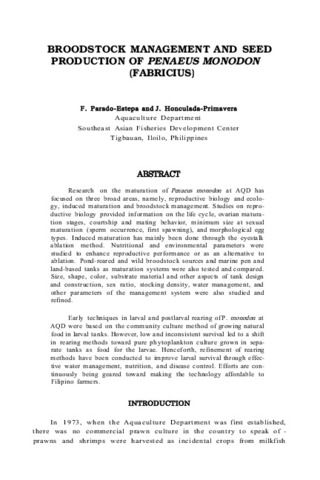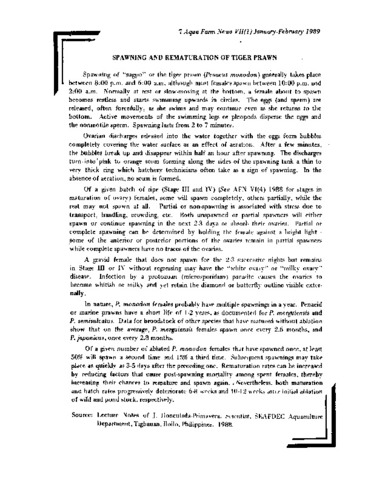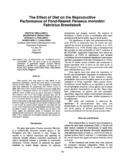Spawner size and the biological components of the reproduction process in Penaeus monodon Fabricius.
Share
Abstract
The biological components of the reproduction process of Penaeus monodon spawners collected from the wild along Tigbauan-Guimbal coastal area, Philippines, were evaluated. Data were collected on wet body weight, eggs per female, egg size, egg quality, hatching rate and percentage survival at the first zoea stage. There was a general trend for number of eggs per female and egg size to increase with increasing body weight. However, the larger spawners were not the most efficient in terms of number of eggs per unit body weight. There was a significant positive correlation between body weight and number of eggs per female. Larger eggs may be associated with larger body size. However, the size of individual eggs tends to be dependent upon the total number of eggs spawned per female.
Subject
Taxonomic term
Collections
Related items
Showing items related by title, author, creator and subject.
-
Broodstock management and seed production of Penaeus monodon (Fabricius)
Parado-Estepa, Fe D.; Honculada-Primavera, Jurgenne (Aquaculture Department, Southeast Asian Fisheries Development Center, 1988)Research on the maturation of Penaeus monodon at AQD has focused on three broad areas, namely, reproductive biology and ecology, induced maturation and broodstock management. Studies on reproductive biology provided ... -
Spawning and rematuration of tiger prawn
Carreon-Lagoc, Julia; Southeast Asian Fisheries Development Center, Aquaculture Department (Aquaculture Department, Southeast Asian Fisheries Development Center, 1989) -
The effect of diet on the reproductive performance of pond-reared Penaeus monodon Fabricius broodstock
Millamena, Oseni M.; Primavera, Jurgenne; Pudadera, Rosario A.; Caballero, Rosemarie V. (Asian Fisheries Society, 1986)Three practical diets were tested for their effects on the reproductive performance, survival and larval quality of pond-reared Penaeus monodon. Diets A, B and C were formulated to contain the same basal components but ...






